
Genus is a taxonomic rank above species and below family as used in the biological classification of living and fossil organisms as well as viruses. In binomial nomenclature, the genus name forms the first part of the binomial species name for each species within the genus.

A pine is any conifer tree or shrub in the genus Pinus of the family Pinaceae. Pinus is the sole genus in the subfamily Pinoideae.
Virus classification is the process of naming viruses and placing them into a taxonomic system similar to the classification systems used for cellular organisms.

Minnow is the common name for a number of species of small freshwater fish, belonging to several genera of the family Cyprinidae and in particular the subfamily Leuciscinae. They are also known in Ireland as pinkeens.
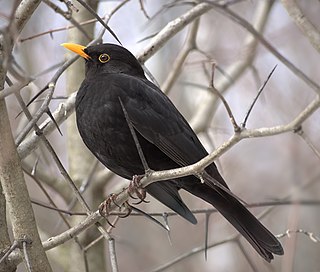
True thrushes are medium-sized mostly insectivorous or omnivorous birds in the genus Turdus of the wider thrush family, Turdidae. The genus name Turdus is Latin for 'thrush'. The term thrush is used for many other birds of the family Turdidae as well as for a number of species belonging to several other families.
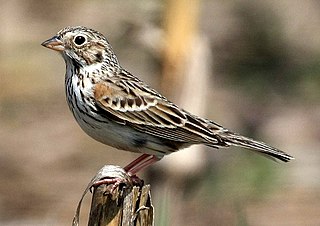
The vesper sparrow is a medium-sized New World sparrow. The only member of the genus Pooecetes, it is a pale sparrow with brown streaks that breeds across the grasslands of northern North America. It migrates to winter in the southern United States and Mexico.

Carpet sharks are sharks classified in the order Orectolobiformes. Sometimes the common name "carpet shark" is used interchangeably with "wobbegong", which is the common name of sharks in the family Orectolobidae. Carpet sharks have five gill slits, two spineless dorsal fins, and a small mouth that does not extend past the eyes. Many species have barbels.

Conium is a genus of flowering plants in the family Apiaceae. As of December 2020, Plants of the World Online accepts six species.

Fallopia is a genus of about 12 species of flowering plants in the buckwheat family, often included in a wider treatment of the related genus Polygonum in the past, and previously including Reynoutria. The genus is native to temperate and subtropical regions of the Northern Hemisphere, but species have been introduced elsewhere. The genus includes species forming vines and shrubs.

Carcharhinus is the type genus of the family Carcharhinidae, the requiem sharks. One of 12 genera in its family, it contains over half of the species therein. It contains 35 extant and eight extinct species to date, with likely more species yet to be described.
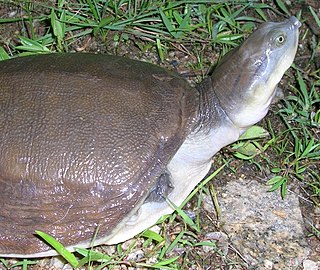
Lissemys is a genus of softshell turtles in the subfamily Cyclanorbinae of the family Trionychidae. The genus is indigenous to southern Asia.

Daphniphyllum is the sole genus in the flowering plant family Daphniphyllaceae and was described as a genus in 1826. The genus includes evergreen shrubs and trees mainly native to east and southeast Asia, but also found in the Indian Subcontinent and New Guinea.

Heteroconchia is a taxonomic infraclass of diverse bivalve molluscs, belonging to the subclass Autobranchia.

Forpus is a genus of neotropical parrots in the family Psittacidae. It is the only genus in the Forpini tribe of the subfamily Arinae.
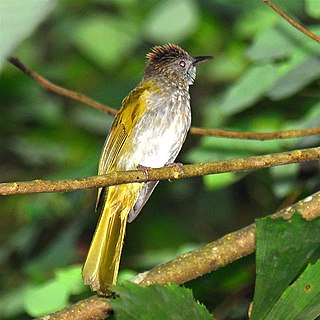
Ixos is a genus of passerine birds in the bulbul family, Pycnonotidae.
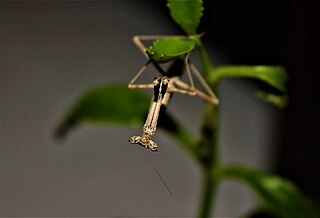
Oxyothespis is a genus of praying mantis in the family Toxoderidae. Members of this genus have been called grass mantises.
Chodsigoa is a genus of shrews in the tribe Nectogalini.

Chelonoidis is a genus of turtles in the tortoise family erected by Leopold Fitzinger in 1835. They are found in South America and the Galápagos Islands, and formerly had a wide distribution in the West Indies.

iNaturalist is an American 501(c)(3) nonprofit social network of naturalists, citizen scientists, and biologists built on the concept of mapping and sharing observations of biodiversity across the globe. iNaturalist may be accessed via its website or from its mobile applications. iNaturalist includes an automated species identification tool, and users further assist each other in identifying organisms from photographs and even sound recordings. As of 9 July 2024, iNaturalist users had contributed approximately 197,660,888 observations of plants, animals, fungi, and other organisms worldwide, and 290,007 users were active in the previous 30 days.
Kaikaifilusaurus is an extinct genus of rhynchocephalians in the family Sphenodontidae from the Late Cretaceous of South America. Fossils of the genus were found in Cenomanian sediments of the Candeleros Formation and Turonian layers of the Huincul Formation, both of the Neuquén Basin and the Albian strata of the Cerro Barcino Formation in the Cañadón Asfalto Basin, all in Patagonia, Argentina. The genus contains two species, K. minimus and the type species K. calvoi.


















